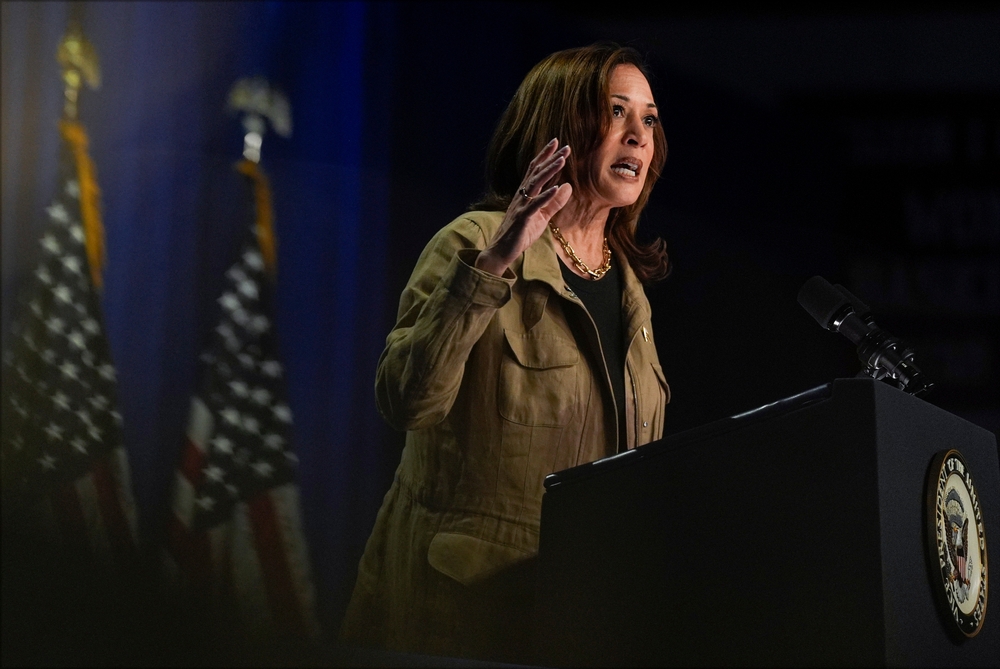- BlackVoter.Org
- Posts
- BlackVoter.Org
BlackVoter.Org

In "Rooftop Revelations," Pastor Corey Brooks argues against the allure of instant gratification found in identity politics, urging Americans to focus on character instead. He draws inspiration from Martin Luther King Jr.
's vision, advocating for deeper connections and understanding among individuals, transcending superficial labels. By emphasizing the importance of character over identity, Brooks encourages a collective journey towards unity and respect.
He challenges viewers to reflect on their values and engage in meaningful dialogue that fosters genuine relationships. This thought-provoking perspective invites us to rethink how we define ourselves and relate to others, promising a more profound and fulfilling sense of identity beyond politics.

In a bold shift in American politics, Black women leaders are redefining political norms and practices, prioritizing dignity over tradition. Vice President Kamala Harris sparked conversation by skipping the customary welcome for her successor, showcasing a new approach to political engagement.
Former First Lady Michelle Obama and representatives like Jasmine Crockett and Ayanna Pressley have similarly focused on community service instead of ceremonial roles, using their presence—or absence—as a powerful statement for respect and recognition. This movement not only challenges established conventions but also enhances voter mobilization and community organization, marking a significant evolution in political culture.
The influence of these leaders highlights a future where respect and dignity are paramount, reshaping how power is exercised and recognized in American democracy. As these dynamics continue to unfold, the transformative impact of Black women in political spaces promises to resonate for generations, creating new standards for engagement and governance.

Women played an indispensable role in the civil rights movement alongside Martin Luther King Jr., yet their contributions are often overshadowed by their male counterparts.
Historian Vicki Crawford highlights these trailblazers in her work, emphasizing the activism of women like Coretta Scott King, who not only supported her husband but was a fierce advocate for social justice in her own right. From the March on Washington—where women organized behind the scenes—to local leaders like Septima Clark and Amelia Boynton Robinson, these women strategically advanced civil rights and voter registration efforts.
Despite their significant roles, historical accounts frequently omit their names and actions. As we reflect on the movement's legacy, it's vital to celebrate and acknowledge the powerful women whose commitment and activism helped shape the pursuit of equality, underscoring that their stories are just as crucial as those of the more recognized figures in the fight for justice.

In his second inaugural address, President Donald Trump painted an ambitious vision for America, proclaiming, “The golden age of America begins right now.” He emphasized that the country will become the "envy of the world," vowing to implement aggressive economic and immigration policies.
Key promises included tariffs on foreign goods, expanding drilling, and a crackdown on illegal immigration—highlighting his intention to issue a series of executive actions aimed at these issues. Stressing the need to address inflation and rising prices, Trump acknowledged these concerns among Americans but asserted his plan would usher in prosperity.
He also invoked the idea of political retribution, pledging to “rebalance the scales of justice” and combat the "weaponization" of politics. As he steps into a new term, Trump’s approach reflects the priorities of his base and sets the stage for a contentious political landscape ahead.

The Underground Railroad Museum in Flushing takes a momentous step to honor Martin Luther King Jr. and the vital cause he championed—the fight for equal rights.
Director Kristina Estle urges the community to reflect on King's profound commitment to justice, rooted in a history that stretches back to the aftermath of slavery. From the Emancipation Proclamation to the Jim Crow laws, the battle for equality has been fraught with challenges, yet the resilience of countless individuals paved the way for civil rights.
Highlighting key events such as the Montgomery Bus Boycott and the Freedom Rides, the museum connects past struggles to today's ongoing quest for justice. As the nation celebrates MLK Day, Estle encourages everyone to visit the museum and deepen their understanding of this critical chapter in U.
S. history, reminding us that the fight for equality continues.

Join us on January 20, 2025, for a heartfelt celebration of Martin Luther King Jr. Day at the Cleveland History Center! From 10:00 am to 4:00 pm, explore our galleries for FREE and immerse yourself in African American history and culture.
Special exhibitions include “History in Their Hands: Black Photographers in Cleveland” and engaging art displays by Bonnie Venable and Rodney Carpenter. Enjoy rides on the Grand Carousel for just $3 and get expert help from the WRHS Genealogy Committee in starting your family history research.
Don’t miss our fascinating exhibitions on the 1968 Poor People’s Campaign, organized in collaboration with the Smithsonian Institution. Plus, a complimentary shuttle will zip you to all University Circle museums every 15 minutes.
Come honor Dr.
